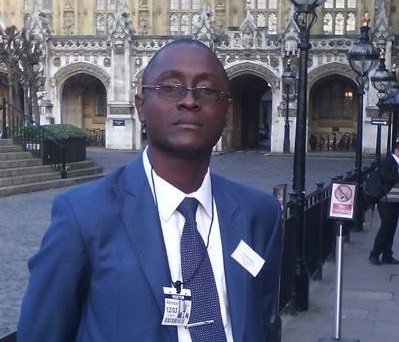
Human rights defender's story: Erik-Aimé Semien from Côte d’Ivoire
Erik-Aimé Semien discusses his role in advocating for human rights and democracy in post-conflict Côte d'Ivoire, emphasising the importance of combating impunity and fostering inclusive institutions.
Erik-Aimé Semien is a lawyer and human rights defender at Observatoire Ivoirien des Droits de l’Homme, a non-governmental organisation that aims to achieve human rights progress through capacity building and constructive dialogue with the authorities.
‘What we want’, Eric explains, ‘is to make them understand why human rights are important for the progress of our nation’.
Eric was first drawn to human rights when Côte d’Ivoire plunged into civil war in 1999, following a military-led coup d’etat. What followed were ten years of violence and sectarian strife.
‘We are a country coming out of ten years of civil war, but the main problems are not yet solved. It was widespread frustration and a lack of democratic institutions that caused the war; and it is for overcoming frustration and the creation of democratic institutions that we continue to struggle.’
Eric explains that frustration is caused when there is a lack of transparency in government work, when the president favours his regional or ethnic group over others, when there is impunity for war crimes, and when voices critical of the government are excluded from debate.
‘Take the national TV, a public service paid for by public taxes. If you watch TV in Côte d’Ivoire, you will receive the impression that the perspective of the president of the republic is the only perspective there is. It was the same for the former president. This means that if you disagree with government policy, National TV will no longer interest you, for you will find no expression of your opinion. This begs the question, if you disagree, where can you go? To whom can you speak? The result is frustration. The media outlets need to be open to everybody, to civil society, to the opposition, to everybody.’
In addition to advocating for more inclusive democratic institutions, Observatoire Ivoirien des Droits de l’Homme works to combat impunity. The war lasted ten years, but today, not only do many people on the winning side who committed human rights violations walk free, but they also enjoy appointments in the army and the administration.
‘After the war I think we should have a fair and equitable justice. What a victim wants is to see those who committed human rights violations behind bars. We organise victims and take their cases to court. We say to the judge, find out who did this and send them to prison. If they do this, it will release tension. The government recently set up a trust fund that provides financial compensation for victims. This is a positive step. But it needs to be accompanied by a clear message: whoever you are, in whatever position, you are not above the rule of law.’
One of the challenges Eric faces is a lack of awareness in the government of what human rights defenders are and what they do.
‘In Côte d’Ivoire certain authorities don’t have a clear idea of the role of civil society. They think we are causing a disturbance when all we want is the progress of our nation. But I have to admit that the situation is improving. Previously the authorities were closed but now they are much more open. They listen to us more and we are allowed to participate in meetings.’
One remarkable result of this increased openness on the government’s part is the adoption in June 2014 of a law that protects human rights defenders.
‘In the build up to the drafting of this law, we clearly explained why protecting human rights defenders was important. Many human rights NGOs were involved in the process. We had several meetings with parliament representatives and even at the national assembly. We had to explain who human rights defenders were and why protecting them is important. I am proud of Côte d’Ivoire that we have adopted this law, which is the only law of its kind on the African continent.’
The law, although still largely unknown, has already had a positive impact. In 2014 the leaders of a public assembly protesting the high costs of grocery goods were arrested. But the Observatioire Ivoirienne intervened and showed the prosecutor the law. The protesters were subsequently freed.
‘Now, whenever we have a problem with authorities, we can show them this law, and they will see that we are protected. This will make our work much easier and less dangerous. In a democracy, in a rule of law state, the government should engage with civil society. The role of civil society is that of counter balance. We don’t want to antagonise the authorities needlessly nor do we seek power. We would like to see change coming from the inside and genuinely inclusive democratic institutions and not just superficial engagement. I am proud of Côte d’Ivoire for the progress we have made, of which this new law is tangible proof, but we still have some way to go. The frustration that causes war needs to be eliminated for good.
